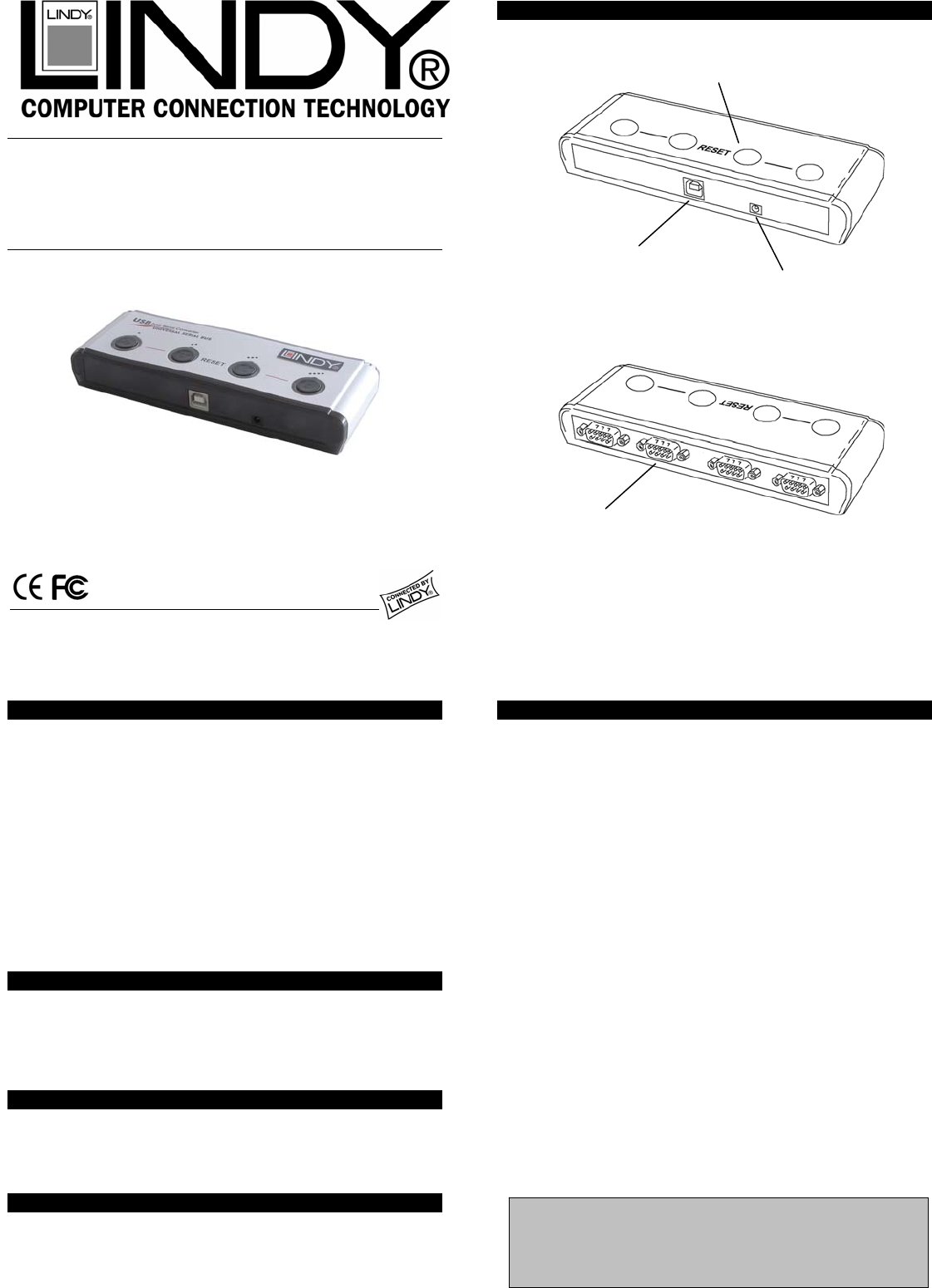
© LINDY ELECTRONICS LIMITED & LINDY-ELEKTRONIK GMBH – 1
st
EDITION (March 2006)
USB to 4 Port
Serial Converter
Installation Guide English
Benutzerhandbuch Deutsch
LINDY No. 42858
www.lindy.com
Product Information
Reset button
USB connection
Connection for optional
power supply
Serial port connection
Introduction
Thank you for purchasing the LINDY USB to 4 Port Serial Converter.
This device provides multiple external RS-232 connections to your PC. It
features four standard 9 Way D Male connectors for connecting your
serial devices.
The unit’s compact size makes it ideal for use with notebooks or as an
alternative to installing an internal serial card in your desktop PC. It
supports most standard RS-232 serial devices such as modems, ISDN
terminal adaptors, PDAs, barcode readers, label printers, EPOS devices
etc.
Installation is easy with no changes to IRQ, I/O Address or DMA settings
needed. In most instances, when the converter is connected to a PCs
USB port or to a self-powered USB, no additional power supply is
required. However, if required, an optional 5V DC (+ on centre) USB
power supply with mini DC jack may be used to self power the converter.
Features
USB 1.1 interface, USB 2.0 Full Speed compatible
Provides 4 separate RS-232 serial ports (4 x 9 Way D Male)
Reset button for device detection
Powered from the USB bus
Chipset: FTDI
Package Contents
USB to 4 Port Serial Converter
USB Type A to B Cable
Driver CD
This manual
System Requirements
PC with available USB port
OS: Windows 98SE/ME/2000/XP, Linux*
* For a Linux driver, please visit this website: www.ftdichip.com
Installation
1. Ensure the computer has booted up into its OS and then, using the
supplied USB Type A to B cable, connect the USB to Serial
Converter to an available USB port.
2. The New Hardware Wizard will appear; Windows will detect and
install a Standard USB Hub and begin to install the drivers for the 4
RS-232 Converters,
3. You may use the drivers from the enclosed CD. Select not to use the
Windows Update Server online. Insert the CD and click Next to
continue.
4. When the dialog box appears, leave the default choice (Search for
the best drivers for your device); click Next to continue. Windows
should find the appropriate drivers automatically. If not, you may have
to select the appropriate directory USB To Serial on the CD.
5. If a Windows Logo test dialog box appears, click Continue
installation.
6. When the Ready to Install dialog box appears, click Next.
7. The driver will be installed. A dialog box will appear to confirm the
installation has completed; click Finish.
8. Repeat the above procedure for the installation of the other three
serial devices.
9. To confirm the devices were correctly installed, select:
Control Panel > System > Hardware > Device Manager
10. From the Device Manager list, select: Universal Serial Bus
controllers, you will see four entries listed for USB High Speed
Serial Converter.
Note: If you want to remove a serial device from one of the ports
and then connect a different device to that port, just plug in the
new device and push the RESET button for the relevant port. The
system will detect the new device. Then, simply follow the
installation procedure again, as outlined above.
